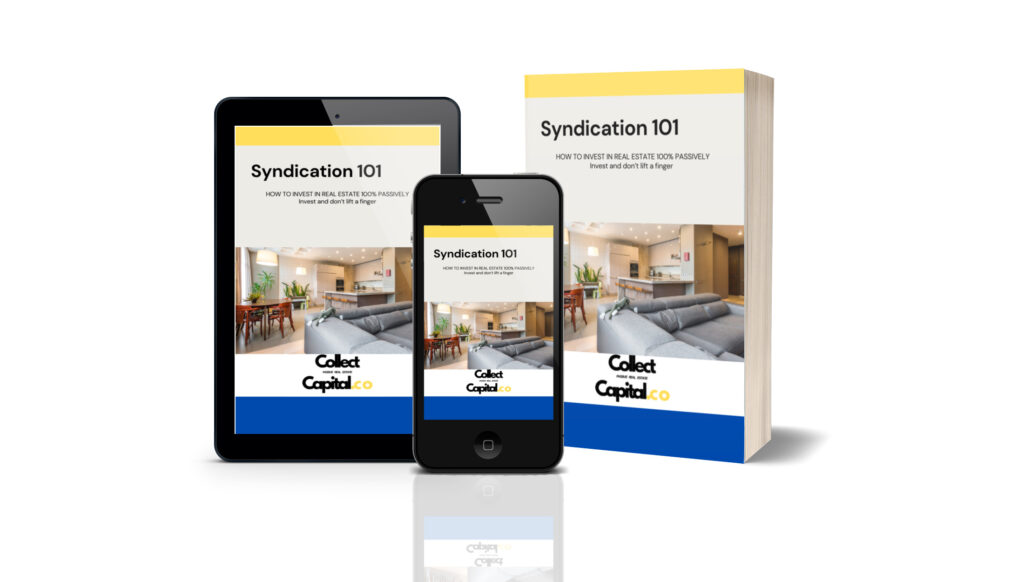See Video below
See Video Below
Welcome to Collect Capital, where lucrative apartment syndication meets expertise. Our portfolio offers exceptional returns in the thriving real estate market.
Based out of sunny West Palm Beach, Florida we provide 15-29% ROI on multifamily properties in Texas, Arizona, North Florida, and Southwest Region.
Meet The Team
Each deal we work with separate teams of Operating Partners, each delivering experience in their area of responsibility

Tim Collezioni
Tim Collezioni brings nearly 30 years experience as an investment banker and sales executive for institutional commercial real estate and serves as advisory for the Syndication underwriting and operations.
Tim Lewellen
Tim Lewellen brings over 10 years experience in compliance, audit, and public accounting at a Big 4 CPA firm, the mortgage servicing industry, and consumer financing industry. He serves capital raising and investor relations for the Syndication.

Frequently Asked Questions
Syndication is the pooling of investor money where the investor is typically a limited partner and the general partner, or active partner, puts the deal together and manages the business plan to provide a return for the benefit of all investors. The standard process of coordinating the acquisition of a property and the pooling of investor money. A syndication involves two parties: The investor, typically a passive limited partner (LP) and the General partner (GP), the active partner that puts the deal together and implements the business plan to provide a return for all parties. As a passive investor, you invest your money, then sit back and start receiving returns. You reap the financial benefits of real estate investment without the time commitment and hard work. – no need to worry about tenants, termites, or toilets. We take care of all that and provide you regular updates as the project progresses.
Annual returns are targeted in the 8-10% range and with an Average IRR in the 15% range over the holding period (typically, 5 years). In a value-add project, a large part of the investor returns come in the year of sale. Actual returns vary on a property by property basis. See the private placement memorandum (PPM) for specific property investment risks.
Generally, we model each investment with a 5-year holding period. At this time, we refinance or sell the asset to extract as much cash out of the deal for the investors. During the holding period we work hard to increase Net Operating Income (NOI), raise rents, make improvements to tenants, renovate the property, and son. This provides ample time to execute our value-add plan and then cash flow for a few years while looking for an opportunistic sale. Some investor principal could be returned as early as year 2 from a refinancing event or we may want to continue to cash flow till year 7, if the market is down in year 5. We will communicate the team’s plan to all team members, including our passive investors.
Minimum investment varies from deal-to-deal but generally are set at $50,000 with preference given to investors with more to invest.
Typically, recurring dividend payments are received Quarterly.
Apartment syndications are very tax efficient. As a limited partner, you will benefit from your portion of the investment’s deductions for property taxes, loan interest, depreciation, etc. We will also use a cost segregation strategy to accelerate depreciation. The tax loss can then be used to offset other income depending upon your individual tax situation. At the time of sale, the partnership gains are treated as long-term capital gains.
Yes 100% – We operate on a core value of treating investors’ money as if it were our own. We invest alongside our clients in every deal.
Yes – We model different scenarios to show our breakeven point for profitability given a decline in occupancy or if rents drop below projections.
Yes – Many of our investors do. You can invest in real estate with certain retirement accounts. We are happy to discuss how to boost your IRA investing returns with real estate investing.
The returns forecasted are described in the private placement memorandum (PPM) and vary from deal to deal. The most common fee is an acquisition fee based on purchase price and is paid at closing. This covers the general partner’s costs to find the deal and get it under contract. The second most common fee is the asset management fee which is compensation for holding the property manager accountable, to ensure execution of the business plan, bookkeeping, and distribution of checks and K1s. The asset management fee is aligned with the investor’s interest as it is based on the property’s revenues. Industry averages are 1-3 % for both fees.
It would be You, a passive investor with limited liability in the investment property. Their risk is limited to the amount they invest. Their other assets are protected. They cannot be sued, Limited partners are not on the loan, and are not responsible for the active performance of the property. A limited partner does not sign the note but they are partial owners of the property up to their investment.
This is deal specific and if it is a specified offering, the investment involves a particular property. The title of the property will be held in an LLC. Example, “ABC Property LLC” for which that property is the only asset (reduces liability). Your investment will represent a specific class and number of shares in this LLC.
Your investment and Funds are always wired directly to Escrow of the fund or sent by check. We never touch, control or take possession of your funds, ever. Please be wary of any investment company that asks to wire funds directly to their accounts. Additionally, all documentation is available for your records in the Investor Login.
For example and illustration, when we take over a property, even a 300-unit apartment will have 15 vacant units if occupancy is at 95%. We start there. Next month when 10-12 leases are up, we introduce the residents to their new renovated unit (move them in) and start renovating their vacated unit and keep repeating this process month after month. Our goal is to improve the interiors and exteriors enough to increase renewal rates.
© 2024 Collect Capital . – All Rights Reserved.

